Technology
What massive health care cyberattack at Ascension means for your privacy, security

Ascension, one of the largest health systems in the United States with 140 hospitals, faced a significant cyberattack that disrupted its operations. It was reported that the attack caused patient record systems to go offline, forcing medical staff to resort to paper records. This event is a stark reminder of the vulnerability of America’s health care system to cyberthreats.
CLICK TO GET KURT’S FREE CYBERGUY NEWSLETTER WITH SECURITY ALERTS, QUICK VIDEO TIPS, TECH REVIEWS AND EASY HOW-TO’S TO MAKE YOU SMARTER
Hospital workers (Ascension) (Kurt “CyberGuy” Knutsson)
What was the immediate impact of the cyberattack?
The aftermath of the cyberattack was immediate and disruptive. Emergency crews had to divert patients to other hospitals, and staff had to implement manual workarounds. Essential systems like MyChart, phone services and electronic ordering for tests and medications were affected. The company has had to delay some elective procedures and appointments, urging patients to come prepared with detailed notes on their conditions.

Mother, daughter and doctor in hospital (Ascension) (Kurt “CyberGuy” Knutsson)
MORE: 5 BEST TELEMEDICINE APPS FOR VIRTUAL HEALTH CARE
Ascension’s response
Ascension’s response was swift, with an investigation launched to determine the extent of the breach. The health system, which is based in St. Louis, has not provided a timeline for service restoration but has assured us that they are working diligently to resolve the issues. Nurses and staff have had to adapt quickly, facing challenges such as accessing electronic health records and using devices like glucometers that rely on electronic identification systems.

Emergency sign outside hospital (Kurt “CyberGuy” Knutsson)
MORE: HOW GENERATIVE AI COULD CUT HEALTH CARE COSTS AND DEVELOP NEW CANCER DRUGS
Cybersecurity in health care
The recent security failures in hospitals have been likened to car owners leaving their keys on the seat with the door unlocked. The American Hospital Association supports voluntary cybersecurity goals but has expressed concerns over mandatory measures proposed by the Biden administration. They argue that such requirements could unfairly penalize hospitals for vulnerabilities introduced by third-party technologies.

Image of stethoscope in hospital (Kurt “CyberGuy” Knutsson)
MORE: A DAD’S LIFE-SAVING INVENTION IS INSPIRED BY HIS WIFE’S NEAR-DEATH ORDEAL
The bigger picture paints concerning trend in health care
This cyberattack is not an isolated incident. It follows a concerning trend of increased cyberthreats to U.S. medical systems. Just recently, Change Healthcare suffered a similar fate, which had widespread repercussions across the health care industry. The Ascension hack, while smaller in scope, directly impacted systems crucial for patient care.
An Ascension spokesperson provided this statement, which is posted on the nonprofit’s website, “Safely caring for patients remains our highest priority as we navigate this cybersecurity incident. We are actively supporting our ministries as they continue to provide safe, patient care with established downtime protocols and procedures, in which our workforce is well-trained. It is expected that we will be utilizing downtime procedures for some time.”
You can read the company’s entire statement here.
8 proactive steps to take in the face of health care cyberattacks
In the wake of the cyberattack on Ascension, consider taking several proactive steps to protect your personal information and prepare for potential disruptions in health care services:
1) Stay informed: Keep up to date with the latest news from Ascension and other reliable sources to know the status of the systems and services.
2) Personal health records: Maintain personal health records saved on your own devices or printed out, including a list of medications, allergies, past surgeries and other relevant health information. This can be invaluable if electronic health records are temporarily inaccessible.
3) Emergency preparedness: Have a plan for medical emergencies that includes knowing alternative health care facilities and understanding how to reach them if your primary hospital is affected. For example, my nearest emergency department recently had a waiting time of several hours while a top hospital an hour away could see many patients within minutes.
4) Cybersecurity best practices: Practice good cybersecurity hygiene by using strong, unique passwords for online accounts. Consider using a password manager to generate and store complex passwords. Also, enable two-factor authentication where available.
5) Vigilance against phishing: Be extra cautious of phishing attempts, as cyberattacks often lead to an increase in phishing emails and calls, trying to exploit the situation. The best way to protect yourself from clicking malicious links that install malware that may get access to your private information is to have antivirus protection installed on all your devices. This can also alert you of any phishing emails or ransomware scams. Get my picks for the best 2024 antivirus protection winners for your Windows, Mac, Android & iOS devices.
6) Contact health care providers: If you have appointments or procedures scheduled, contact your health care provider to confirm or reschedule as needed should a cyberattack disrupt normal operations.
7) Patient portals: If you use patient portals like MyChart, monitor them for updates regarding your medical records and communication with health care providers.
8) Data breach response: In case of a data breach, be ready to follow instructions from Ascension or any affected medical provider regarding credit monitoring or other protective measures.
By taking these eight steps, you can help safeguard your personal health information and ensure better continuity of care during cyber-related disruptions.
Kurt’s key takeaways
The cyberattack on Ascension underscores the urgent need for stronger cybersecurity measures in health care. With the White House pushing for “mandatory minimum” cybersecurity standards, it’s clear that voluntary measures are no longer sufficient. The health care industry must prioritize cybersecurity to protect against such threats and ensure the safety and privacy of patient data. For us as patients, we need to have a backup plan and keep track of our medical records as much as possible.
What role should government agencies play in bolstering cybersecurity measures within private health care systems? Let us know by writing us at Cyberguy.com/Contact.
For more of my tech tips and security alerts, subscribe to my free CyberGuy Report Newsletter by heading to Cyberguy.com/Newsletter.
Ask Kurt a question or let us know what stories you’d like us to cover.
Answers to the most asked CyberGuy questions:
Copyright 2024 CyberGuy.com. All rights reserved.

Technology
Junji Ito’s terrifying Uzumaki hits Adult Swim in September
/cdn.vox-cdn.com/uploads/chorus_asset/file/25547597/Screen_Shot_2024_07_26_at_3.55.30_PM.png)
Adult Swim’s long-awaited adaptation of Uzumaki finally has a premiere date — and an appropriately creepy trailer. The series, based on the classic horror manga from Junji Ito, will start airing on September 28th. Episodes will hit Adult Swim first, and then stream on Max the following day.
Uzumaki follows a cursed town that is — and I promise it’s scarier than it sounds — plagued by spirals. Here’s the full synopsis:
“Let’s leave this town together,” asks Shuichi Saito, a former classmate of Kirie Goshima, a high school girl who was born and grew up in Kurouzu-cho. Everything from a strange whirlwind, billowing smoke from the crematorium, and the residents is turning into spirals. People’s eyes spin in whirls, a tongue spirals, and the…
Continue reading…
Technology
New prosthetics restore natural movement via nerve connection
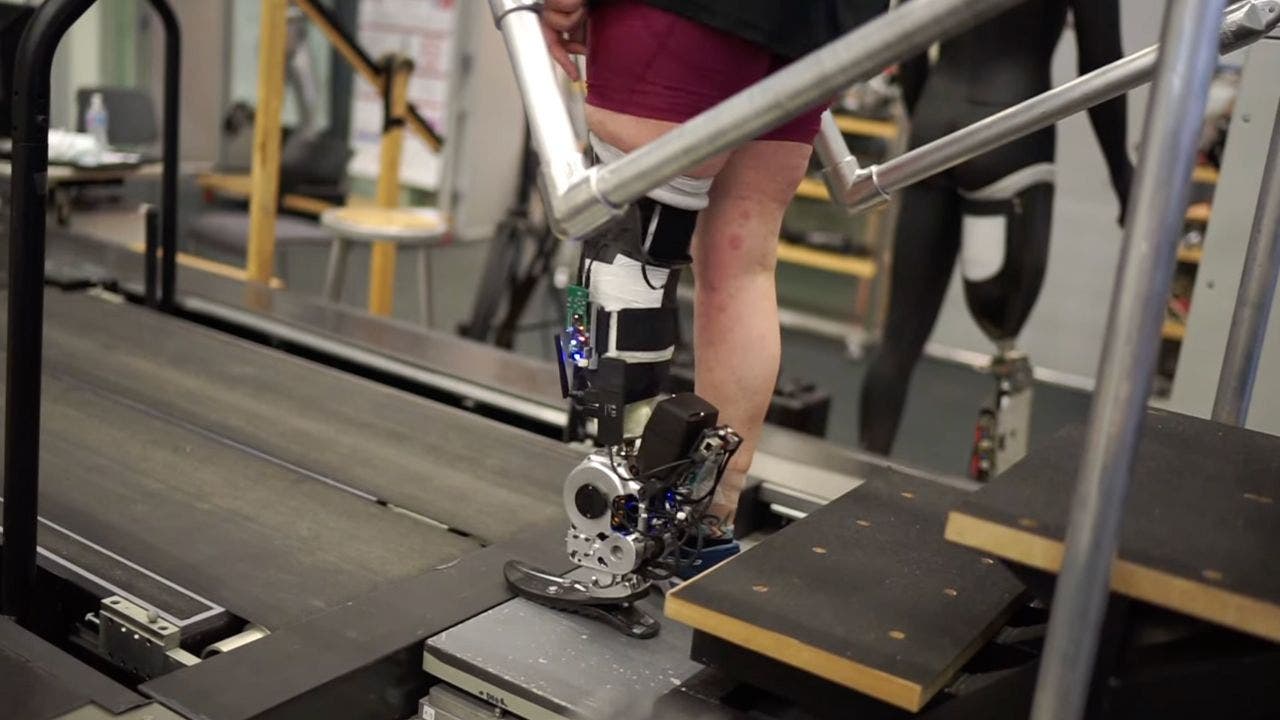
In the world of prosthetics, a groundbreaking advancement is changing the game for individuals with lower-limb amputations.
Researchers at MIT, in collaboration with Brigham and Women’s Hospital, have developed a neuroprosthetic system that allows users to control their prosthetic legs using their own nervous systems.
This innovative approach could bring us closer to a future of fully integrated, naturally controlled artificial limbs.
GET SECURITY ALERTS, EXPERT TIPS – SIGN UP FOR KURT’S NEWSLETTER – THE CYBERGUY REPORT HERE
A person wearing the neuroprosthetic system (Hugh Herr and Hyungeun Song)
The AMI: A surgical game-changer
At the heart of this breakthrough is a surgical procedure known as the agonist-antagonist myoneural interface, or AMI. Unlike traditional amputation methods, the AMI reconnects muscles in the residual limb, preserving the natural push-pull dynamics of muscle pairs. This seemingly simple change has profound implications for prosthetic control and function.
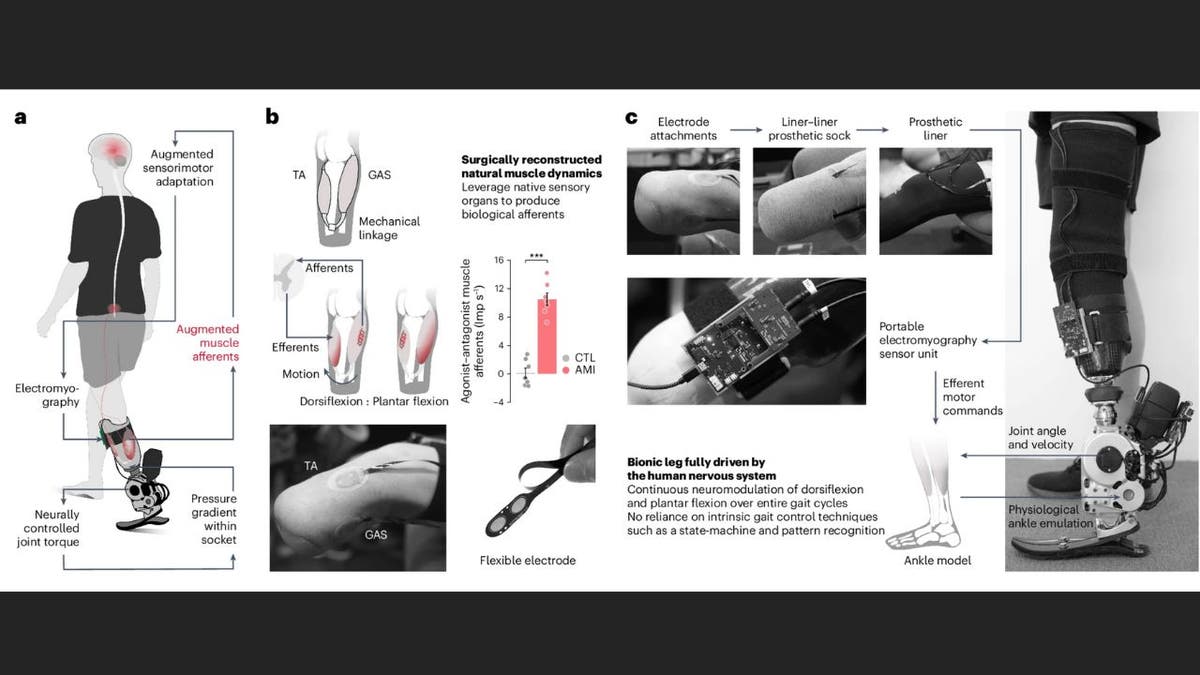
Illustration of how the neuroprosthetic system works (MIT Media Lab)
Dr. Hugh Herr, a professor at MIT and senior author of the study, explained the significance: “This is the first prosthetic study in history that shows a leg prosthesis under full neural modulation, where a biomimetic gait emerges. No one has been able to show this level of brain control that produces a natural gait, where the human’s nervous system is controlling the movement, not a robotic control algorithm.”
HOW TO STOP ANNOYING ROBOCALLS
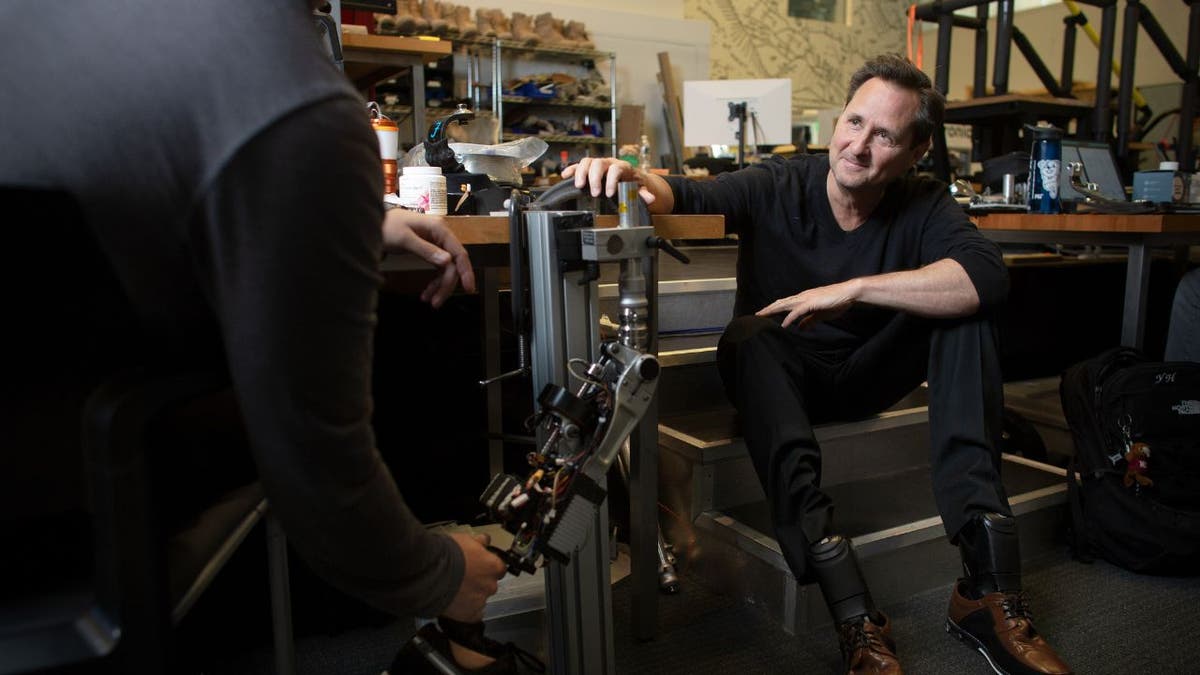
Dr. Hugh Herr pictured with the neuroprosthetic system (Jimmy Day, MIT Media Lab)
AI-DRIVEN EXOSKELETON LIGHTENS YOUR LOAD AND ELEVATES PERFORMANCES
The power of proprioception
The key advantage of the AMI system is its ability to provide users with proprioceptive feedback, the sense of where their limb is in space. This sensory information, often taken for granted by those with intact limbs, is crucial for natural movement and control. With the AMI, patients regain a portion of this vital feedback, allowing them to walk more naturally and confidently.
In the study, seven patients with AMI surgery were compared to seven with traditional amputations. The results were striking. AMI patients walked faster, navigated obstacles more easily and climbed stairs with greater agility. They also demonstrated more natural movements, such as pointing their toes upward when stepping over obstacles, a subtle but important aspect of a natural gait.
CYBERCRIMINALS TAKING ADVANTAGE OF CROWDSTRIKE-LINKED GLOBAL COMPUTER OUTAGE

A person wearing the neuroprosthetic system (Hugh Herr and Hyungeun Song)
CLICK HERE FOR MORE US NEWS
Adapting to real-world challenges
One of the most impressive aspects of the AMI system is its versatility. Patients were able to adapt their gait to various real-world conditions, including walking on slopes and navigating stairs. This adaptability is crucial for everyday life, where terrain and challenges can change rapidly.
The system’s responsiveness was put to the test in an obstacle-crossing trial. AMI patients were able to modify their gait to clear obstacles more effectively than those with traditional prosthetics. This ability to rapidly adjust to unexpected challenges is a hallmark of natural limb function and represents a significant leap forward in prosthetic technology.
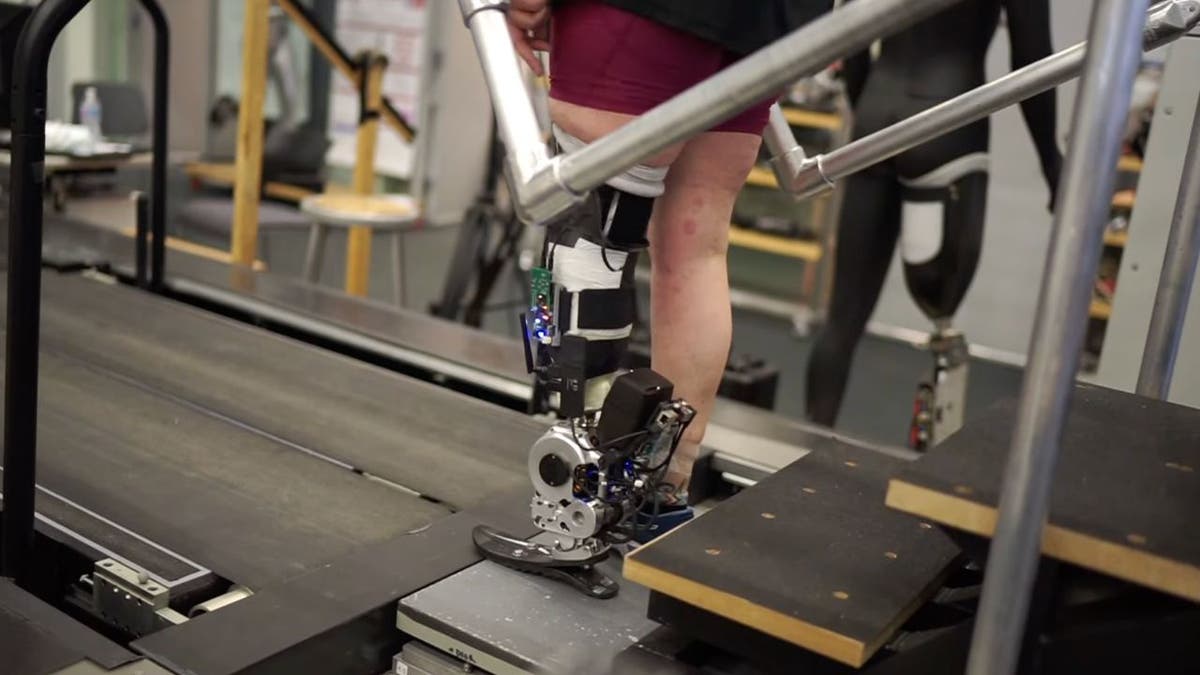
A person wearing the neuroprosthetic system (Hugh Herr and Hyungeun Song)
AI WEARABLE CONTRAPTION GIVES YOU SUPERHUMAN STRENGTH
The science of sensory feedback
The success of the AMI system hinges on its ability to augment residual muscle afferents, which are the sensory signals sent from muscles to the nervous system. Remarkably, even a modest increase in these signals allows for significantly improved control and function. This finding highlights the incredible adaptability of the human nervous system and its ability to integrate and utilize even partial sensory information.
Dr. Hyungeun Song, lead author of the study, notes: “One of the main findings here is that a small increase in neural feedback from your amputated limb can restore significant bionic neural controllability, to a point where you allow people to directly neurally control the speed of walking, adapt to different terrain and avoid obstacles.”

A person wearing the neuroprosthetic system (Hugh Herr and Hyungeun Song)
Looking to the future
While this research represents a significant step forward, it’s just the beginning. The team at MIT is exploring ways to further enhance sensory feedback and improve the integration between the human nervous system and prosthetic devices. The AMI procedure has already been performed on about 60 patients worldwide, including those with arm amputations, suggesting broad applicability across different types of limb loss.
As this technology continues to evolve, we may see even more natural and intuitive control of artificial limbs. The ultimate goal is to create prosthetics that feel and function like a natural part of the user’s body, blurring the line between human and machine.
SUBSCRIBE TO KURT’S YOUTUBE CHANNEL FOR QUICK VIDEO TIPS ON HOW TO WORK ALL OF YOUR TECH DEVICES
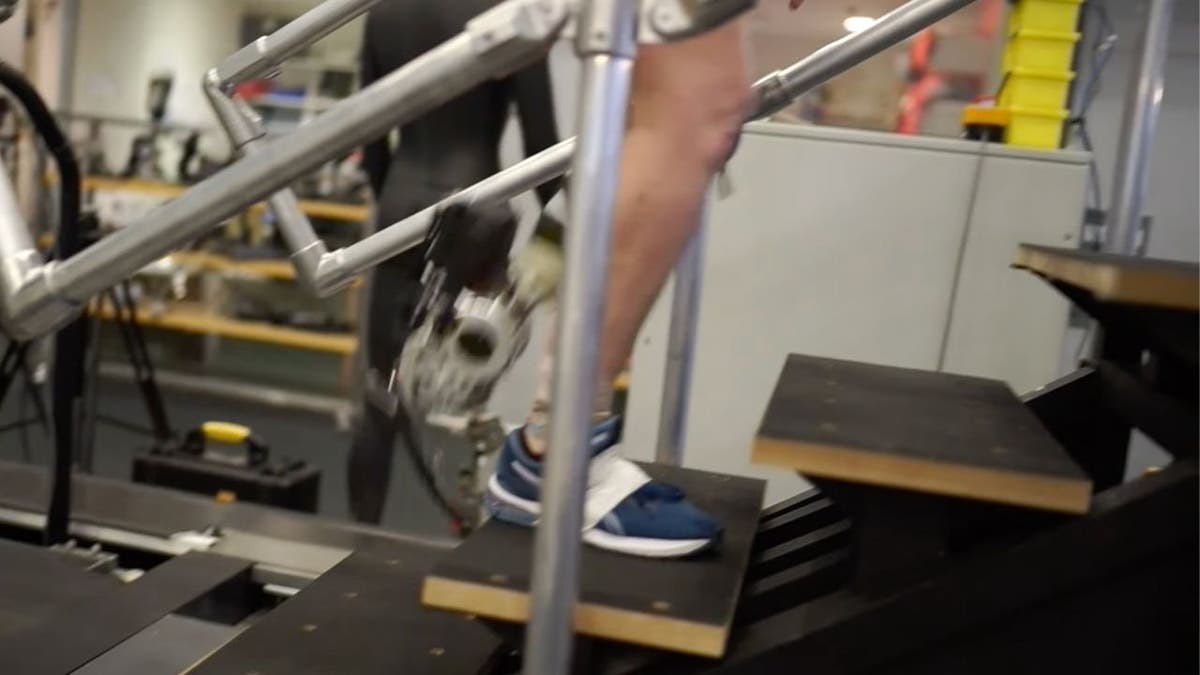
A person wearing the neuroprosthetic system (Hugh Herr and Hyungeun Song)
Kurt’s key takeaways
The development of prosthetic limbs controlled by the nervous system marks the beginning of a new era in bionics. It offers hope for improved mobility, independence and quality of life for millions of people living with limb loss. Moreover, it provides valuable insights into the plasticity of the human nervous system and our ability to integrate with advanced technology.
As we continue to push the boundaries of what’s possible in merging biology and technology, we open up new frontiers in human augmentation and rehabilitation. The implications extend far beyond prosthetics, potentially influencing fields such as neurology, robotics and even our understanding of human consciousness and embodiment.
How comfortable would you be with technology that directly interfaces with your nervous system? Let us know by writing us at Cyberguy.com/Contact.
For more of my tech tips and security alerts, subscribe to my free CyberGuy Report Newsletter by heading to Cyberguy.com/Newsletter.
Ask Kurt a question or let us know what stories you’d like us to cover.
Follow Kurt on his social channels:
Answers to the most asked CyberGuy questions:
Copyright 2024 CyberGuy.com. All rights reserved.
Technology
Here’s your first look at Amazon’s Like a Dragon: Yakuza
/cdn.vox-cdn.com/uploads/chorus_asset/file/25547838/YAKZA_3840_2160_A_Elogo.jpg)
Amazon says that the show “showcases modern Japan and the dramatic stories of these intense characters, such as the legendary Kazuma Kiryu, that games in the past have not been able to explore.” Kiryu will be played by Ryoma Takeuchi, while Kento Kaku also starts as Akira Nishikiyama. The series is directed by Masaharu Take.
Like a Dragon: Yakuza starts streaming on Prime Video on October 24th with its first three episodes.
-

 World1 week ago
World1 week agoOne dead after car crashes into restaurant in Paris
-

 Midwest1 week ago
Midwest1 week agoMichigan rep posts video response to Stephen Colbert's joke about his RNC speech: 'Touché'
-

 News1 week ago
News1 week agoVideo: Young Republicans on Why Their Party Isn’t Reaching Gen Z (And What They Can Do About It)
-

 Movie Reviews1 week ago
Movie Reviews1 week agoMovie Review: A new generation drives into the storm in rousing ‘Twisters’
-

 News1 week ago
News1 week agoIn Milwaukee, Black Voters Struggle to Find a Home With Either Party
-

 Politics1 week ago
Politics1 week agoFox News Politics: The Call is Coming from Inside the House
-

 News1 week ago
News1 week agoVideo: J.D. Vance Accepts Vice-Presidential Nomination
-

 World1 week ago
World1 week agoTrump to take RNC stage for first speech since assassination attempt













